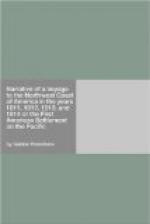We kept these messengers for some days, and having drawn from them important information respecting the country in the interior, west of the Mountains, we decided to send an expedition thither, under the command of Mr. David Stuart; and the 15th July was fixed for its departure.
All was in fact ready on the appointed day, and we were about to load the canoes, when toward midday, we saw a large canoe, with a flag displayed at her stern, rounding the point which we called Tongue Point. We knew not who it could be; for we did not so soon expect our own party, who (as the reader will remember) were to cross the continent, by the route which Captains Lewis and Clarke had followed, in 1805, and to winter for that purpose somewhere on the Missouri. We were soon relieved of our uncertainty by the arrival of the canoe, which touched shore at a little wharf that we had built to facilitate the landing of goods from the vessel. The flag she bore was the British, and her crew was composed of eight Canadian boatmen or voyageurs. A well-dressed man, who appeared to be the commander, was the first to leap ashore, and addressing us without ceremony, said that his name was David Thompson, and that he was one of the partners of the Northwest Company. We invited him to our quarters, which were at one end of the warehouse, the dwelling-house not being yet completed. After the usual civilities had been extended to our visitor, Mr. Thompson said that he had crossed the continent during the preceding season; but that the desertion of a portion of his men had compelled him to winter at the base of the Rocky mountains, at the head waters of the Columbia. In the spring he had built a canoe, the materials for which he had brought with him across the mountains, and had come down the river to our establishment. He added that the wintering partners had resolved to abandon all their trading posts west of the mountains, not to enter into competition with us, provided our company would engage not to encroach upon their commerce on the east side: and to support what he said, produced a letter to that effect, addressed by the wintering partners to the chief of their house in Canada, the Hon. William M’Gillivray.
Mr. Thompson kept a regular journal, and travelled, I thought, more like a geographer than a fur-trader. He was provided with a sextant, chronometer and barometer, and during a week’s sojourn which he made at our place, had an opportunity to make several astronomical observations. He recognised the two Indians who had brought the letter addressed to Mr. J. Stuart, and told us that they were two women, one of whom had dressed herself as a man, to travel with more security. The description which he gave us of the interior of the country was not calculated to give us a very favorable idea of it, and did not perfectly accord with that of our two Indian guests. We persevered, however, in the resolution we had taken, of sending an expedition thither; and, on the 23d Mr. D. Stuart set out, accompanied by Messrs. Pillet, Boss, M’Clellan and de Montigny, with four Canadian voyageurs, and the two Indian women, and in company with Mr. Thompson and his crew. The wind being favorable, the little flotilla hoisted sail, and was soon out of our sight.[J]




